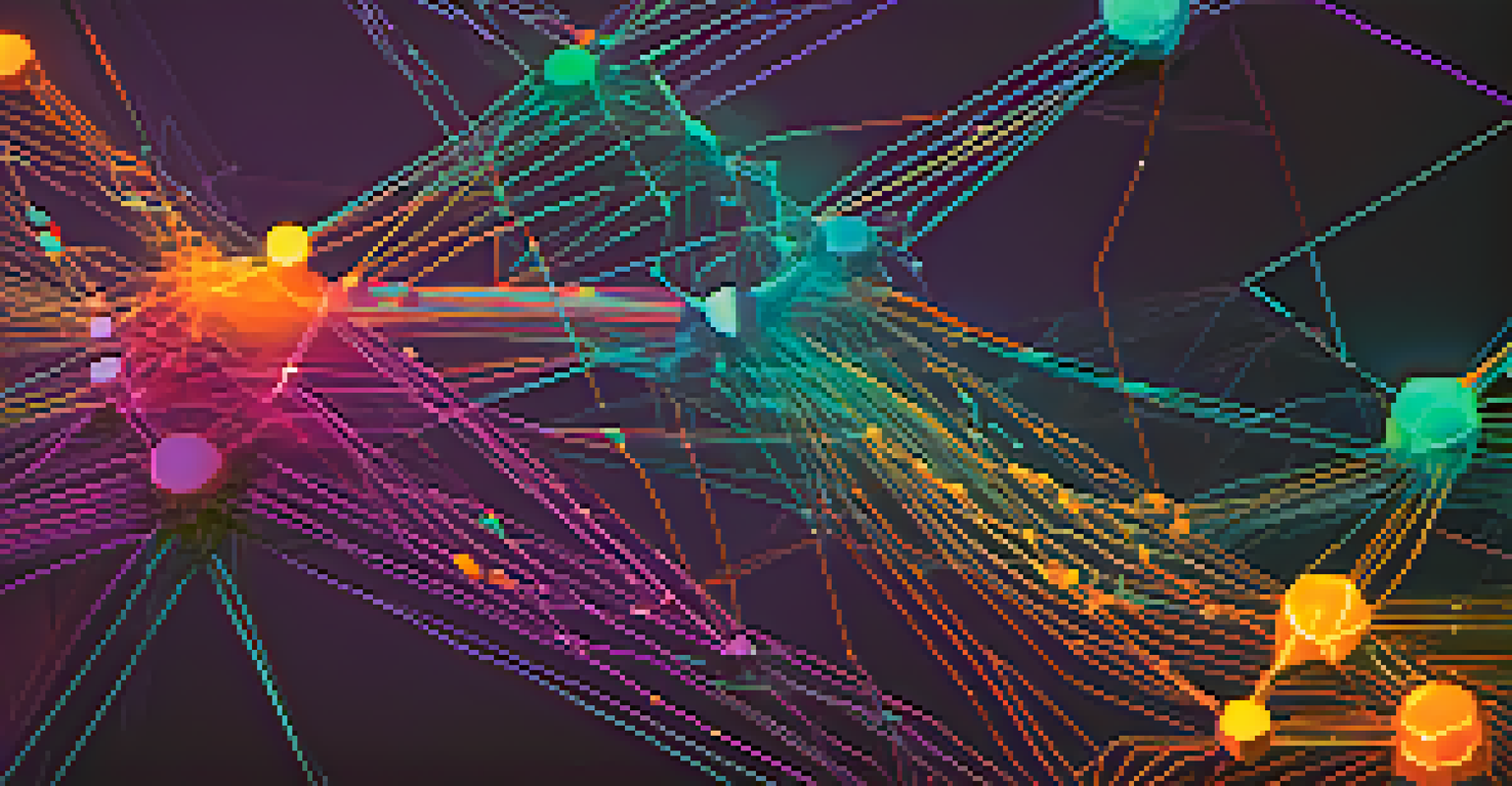The Evolution of Smart Contracts: From Concept to Reality

Understanding the Basics of Smart Contracts
Smart contracts are self-executing contracts with the terms of the agreement directly written into code. Imagine a vending machine: you insert money, select your item, and the machine automatically delivers it without any human intervention. This analogy helps illustrate how smart contracts operate on blockchain technology, ensuring transparency and security.
Smart contracts are the digital evolution of traditional contracts, providing transparency and efficiency without the need for intermediaries.
The concept was first introduced by computer scientist Nick Szabo in the 1990s. He envisioned these digital contracts as a way to facilitate, verify, and enforce the performance of contracts without intermediaries. This idea laid the groundwork for the smart contract technology we see today, showcasing Szabo's foresight in the digital landscape.
At its core, a smart contract automates the execution of agreements, reducing the risk of fraud and increasing efficiency. By removing middlemen, they can save users time and money, making them an attractive option for various industries. As we explore the evolution of smart contracts, it's essential to recognize their foundational principles.
The Birth of Blockchain and Its Role
The advent of blockchain technology in 2008, with the release of Bitcoin, revolutionized the concept of smart contracts. Blockchain serves as a decentralized and immutable ledger, providing a secure environment for executing smart contracts. This technology ensures that once a contract is executed, it cannot be altered, adding an extra layer of trust.

Blockchain's transparency allows all parties to verify the contract's execution without needing a central authority. This is akin to a public library where everyone can check out the same book; the information is accessible, and the process is transparent. This characteristic has made blockchain particularly appealing for industries looking to streamline their operations.
Smart Contracts Automate Agreements
Smart contracts execute agreements automatically, reducing the need for intermediaries and enhancing efficiency.
As blockchain gained popularity, developers began to recognize its potential for hosting smart contracts. This led to the creation of platforms like Ethereum, which was explicitly designed to support them. The synergy between blockchain and smart contracts has been pivotal in pushing the technology into mainstream use.
Ethereum: The Game Changer for Smart Contracts
Launched in 2015, Ethereum significantly impacted the evolution of smart contracts. It introduced a platform that allowed developers to create decentralized applications (dApps) powered by smart contracts. This shift opened the floodgates for innovative projects and use cases across various sectors.
The blockchain is the technology that will allow smart contracts to flourish, ensuring trust and security in digital transactions.
Ethereum's programming language, Solidity, made it easier for developers to write smart contracts. Think of it as a user-friendly toolkit that empowers creators to build complex applications without needing to start from scratch. This accessibility has encouraged a vibrant community of developers and entrepreneurs to explore the potential of smart contracts.
As Ethereum gained traction, it sparked interest in other blockchain platforms with similar capabilities. This competitive landscape has led to continuous improvements in technology and usability, further driving the adoption of smart contracts. The excitement around Ethereum proves that innovation thrives in an open ecosystem.
Real-World Applications of Smart Contracts
Today, smart contracts are being used in various industries, from finance to supply chain management. In finance, they enable automated transactions and complex financial instruments, reducing the need for intermediaries. This can lead to faster transactions and lower costs, benefiting consumers and businesses alike.
In the supply chain sector, smart contracts enhance transparency and traceability. Imagine tracking a shipment from the manufacturer to the retailer; smart contracts can automatically verify each step, ensuring compliance and reducing disputes. This level of visibility fosters trust among all parties involved in the supply chain.
Blockchain Enhances Trustworthiness
Blockchain technology provides a secure, transparent, and immutable environment for smart contracts, ensuring trust among parties.
The healthcare industry is also exploring smart contracts for managing patient records and insurance claims. By automating these processes, healthcare providers can streamline operations and improve patient care. As we continue to discover new applications, the potential of smart contracts seems limitless.
Challenges and Limitations of Smart Contracts
Despite their potential, smart contracts face several challenges. One major issue is the need for accurate data input, known as 'oracle' problems. Just like a recipe requires precise ingredients, smart contracts depend on accurate data to function correctly; otherwise, they may yield unintended results.
Moreover, legal recognition of smart contracts varies by jurisdiction, creating uncertainty for businesses and individuals. In some places, traditional laws may not cover these digital agreements, making enforcement problematic. This legal ambiguity can hinder broader adoption, as parties may hesitate to rely on untested frameworks.
Another challenge lies in the security of smart contracts. While blockchain technology is inherently secure, vulnerabilities in the code can lead to exploits and financial losses. Developers must prioritize rigorous testing and audits to mitigate these risks, ensuring that smart contracts are as safe as possible.
The Future of Smart Contracts: Trends to Watch
As we look ahead, several trends are emerging that could shape the future of smart contracts. One significant trend is the integration of artificial intelligence (AI) to enhance decision-making processes. Imagine a smart contract that not only executes agreements but also learns from past transactions to optimize future ones—this could revolutionize contract management.
Another area to watch is the development of cross-chain compatibility. Currently, many smart contracts operate within their specific blockchain ecosystems, limiting their interoperability. However, as technology advances, we may see solutions that allow smart contracts to interact seamlessly across different blockchains, unlocking new possibilities.
Real-World Applications Abound
Smart contracts are being utilized across various industries, including finance and healthcare, showcasing their versatile potential.
Lastly, growing regulatory frameworks around cryptocurrencies and blockchain technology will likely influence smart contracts' evolution. As governments and organizations seek to establish clear guidelines, businesses can adopt smart contracts with greater confidence. The future looks promising, with smart contracts poised to play a crucial role in the digital economy.
Final Thoughts on Smart Contracts' Evolution
The journey of smart contracts from a theoretical concept to practical applications has been nothing short of remarkable. They've transformed industries by providing efficient, transparent, and secure methods for executing agreements. As technology continues to evolve, smart contracts are likely to become even more integral to our daily lives.
Understanding the evolution of smart contracts helps us appreciate their complexities and potential. Just like any innovation, they come with challenges, but the benefits they offer are compelling. The key will be to navigate these challenges while harnessing the power of smart contracts to create a more efficient and trustworthy world.

In conclusion, smart contracts represent a significant shift in how we think about agreements and transactions. As we embrace this technology, it’s essential to remain informed and adaptable, ensuring that we make the most of the opportunities ahead. The future is bright for smart contracts, and we're just getting started.